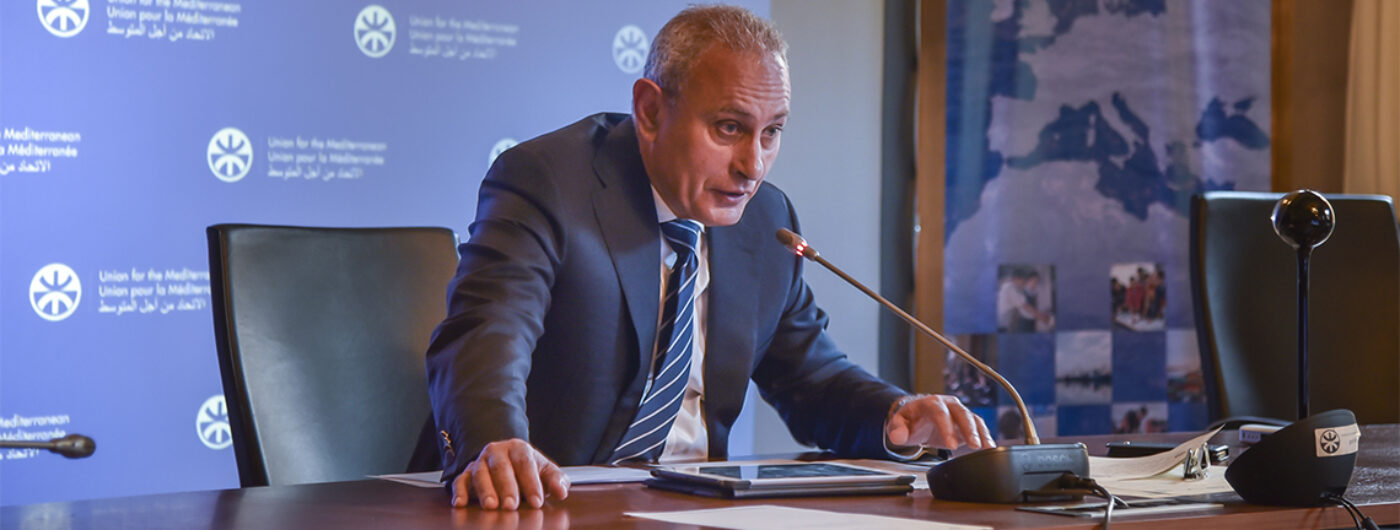
The UfM promotes the social economy as agent of post-pandemic recovery
- The social economy is an enterprise model based on participatory management, the primacy of people over capital, and where profits are reinvested. It is a key player in achieving the Sustainable Development Goals and in reducing inequalities in the Euro-Mediterranean region
- The social economy currently consists a total of 3.2 million enterprises and 15 million jobs in the EU and eight southern Mediterranean countries
- The Union for the Mediterranean, the European Commission and national governments came together to promote and develop the social economy sector in the Mediterranean, in dialogue with key organisations and stakeholders
Barcelona, 26 June 2020. The potential for job creation by promoting social economy in the Middle East and North Africa (MENA) Region and in the Balkans continues to be largely unexplored and this presents an opportunity in the post-pandemic recovery. To discuss this, the Union for the Mediterranean (UfM) online workshop on ‘Social Economy and the Post-Pandemic Recovery’ was held in partnership with the Deutsche Gesellschaft für Internationale Zusammenarbeit GmbH commissioned by the German Federal Ministry for Economic Cooperation and Development, and with the Spanish Confederation of Social Economy Enterprises (CEPES) and the support of the Euro-Mediterranean Network of Social Economy and Social Economy Europe (ESMED).
The event is part of the structured dialogue and systemic engagement of the UfM with key social economy actors to unlock its full potential and explore its role in the post-pandemic recovery. To achieve this, the participants pushed to have the social economy increasingly incorporated into initiatives and programmes aimed at strengthening the private sector in the MENA region and the Balkans. They also declared the importance of improving digital competences within the social economy and increasing their development in emerging and innovative sectors in accordance with the 2030 Agenda for sustainable development.
Nicolas Schmit, EU Commissioner for Jobs and Social Right declared: “Boosting the potential of the social economy to create jobs and complement the provision of social services and care services will help recover from the crisis with enhanced social and economic resilience. By supporting the long-term development of the social economy in the Mediterranean region, we aim at working together along the values of cooperation, solidarity and responsibility.”
Moroccan Minister of Tourism, Air Transport, Crafts and Social Economy, Nadia Fettah stated: “Morocco has been working for long years on the development of Social Economy through a dynamic and multi-stakeholer approach that includes private and public actors that fosters social entrepreneurship.”
Secretary of State for Labour and Social Economy of Spain, Joaquín Pérez Rey: “Spain can identify perfectly with promoting Social Economy, being a key actor and promoter of this model.”
Nasser Kamel, UfM Secretary General highlighted that: “The social economy has the capacity to address the socio-economic injustices and inequalities that were further deepened by the current global crisis, and has an unexploited potential in offering future alternatives to future generations. With this in mind, the UfM will continue to promote increased technical and financial business cooperation in social economy between both shores of the Mediterranean.”
For his part, the President of CEPES, Juan Antonio Pedreño, stated that “Today’s UfM workshop confirms that social economy enterprises and organisations are contributing to the economic and social recovery, and most importantly, the social economy is also a lever for sustainable and fair growth in the Mediterranean and for building a better future for the millions of people who live in the south and north of the Mediterranean.”
Greater interaction and visibility at the Euro-Mediterranean level is helping to increase the number of people, notably young people, interested in taking on the challenge of setting up their own enterprise based on social economy values. The participants stated that in light of the urgency to address the recovery, it is evidently crucial to facilitate the social economy with the necessary financial instruments for Micro and Small and Medium Sized Enterprises (MSMEs), to strengthen incubators and encourage the adoption of legal framework. The exchange of experiences between national networks and advisory experts has been shown to strengthen existing services as well as help develop and professionalise Small and Medium Size Enterprises (SMEs) that form part of the social economy as they adapt to the new market conditions and innovations in different sectors. MSMEs represent 80-90% of total businesses in most MENA countries while representing 99% of all businesses in the EU.
More information
- The Ministerial Declaration of the 4th UfM Ministerial Conference on Employment and Labour (2019) reiterated the commitment of the UfM Member State governments to the social economy, as it is stated in the final declaration.
- UfM and COVID-19 related work
- 25th Anniversary of the Barcelona Process
- Outcome Document of the UfM Social Economy Workshop

